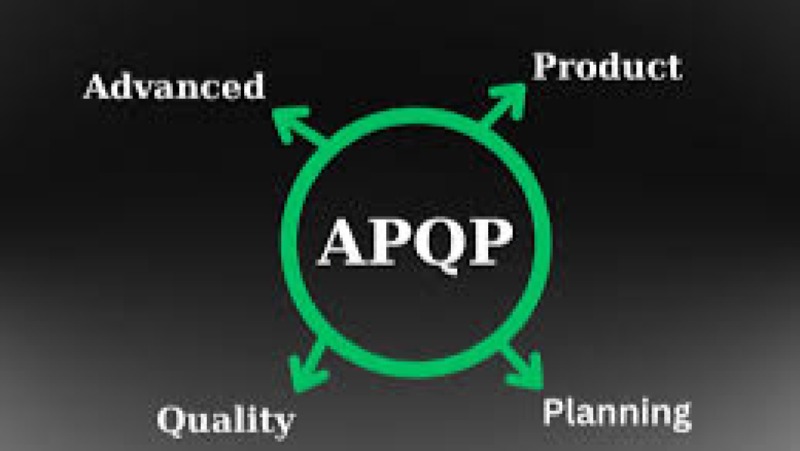APQP Training Course
APQP Training Course has been designed to provide participants with in-depth knowledge of structured planning, risk analysis, and quality control tools that drive process improvements, customer satisfaction, and organizational excellence.

Course Overview
APQP Training Course
Introduction
Advanced Product Quality Planning (APQP) is a strategic quality management framework widely adopted across industries such as automotive, aerospace, manufacturing, and engineering. APQP Training Course has been designed to provide participants with in-depth knowledge of structured planning, risk analysis, and quality control tools that drive process improvements, customer satisfaction, and organizational excellence. Through this course, participants will gain practical skills to integrate APQP with standards such as IATF 16949, ISO 9001, and Six Sigma methodologies.
The training emphasizes proactive planning, process validation, and effective communication throughout the product development lifecycle. By exploring real-world case studies and hands-on learning, learners will understand how APQP enhances cross-functional collaboration, reduces failures, and strengthens supply chain quality. This course is tailored to help professionals meet global quality demands, achieve compliance, and align with trending quality assurance practices that organizations need for competitive advantage.
Course Objectives
- Understand the fundamentals and importance of APQP in product lifecycle management.
- Apply APQP principles to improve customer satisfaction and reduce product failures.
- Align APQP with global quality standards such as IATF 16949 and ISO 9001.
- Develop process flow diagrams, control plans, and FMEA for risk management.
- Strengthen supplier quality assurance through APQP tools and techniques.
- Enhance cross-functional team collaboration and communication.
- Implement advanced quality tools for process validation and continuous improvement.
- Learn real-world applications through industry-driven APQP case studies.
- Improve cost efficiency and reduce waste by applying APQP practices.
- Analyze design and process risks with effective quality planning strategies.
- Gain insights into the five phases of APQP for practical implementation.
- Evaluate the effectiveness of APQP in reducing time-to-market.
- Use trending digital tools to support APQP and Industry 4.0 practices.
Organizational Benefits
- Improved customer trust through consistent product quality.
- Reduced rework, scrap, and manufacturing waste.
- Enhanced supplier quality performance.
- Stronger compliance with global industry standards.
- Accelerated product launch timelines.
- Reduced production costs through proactive planning.
- Improved cross-departmental collaboration and efficiency.
- Increased innovation through structured quality planning.
- Better risk management across product lifecycle stages.
- Sustainable competitive advantage in the global market.
Target Audiences
- Quality Assurance Managers
- Manufacturing Engineers
- Product Development Teams
- Project Managers
- Supplier Quality Engineers
- Process Improvement Specialists
- Compliance and Regulatory Professionals
- Operations Managers
Course Duration: 5 days
Course Modules
Module 1: Introduction to APQP
- Understanding the role of APQP in product development
- Key objectives and benefits of APQP methodology
- Industry relevance and application areas
- APQP and its connection to customer satisfaction
- Global standards integration in APQP
- Case study: Automotive APQP implementation
Module 2: Five Phases of APQP
- Phase 1: Planning and program definition
- Phase 2: Product design and development
- Phase 3: Process design and development
- Phase 4: Product and process validation
- Phase 5: Feedback, assessment, and corrective actions
- Case study: End-to-end APQP cycle in aerospace
Module 3: Process Flow Diagrams and Control Plans
- Importance of structured process mapping
- Building effective process flow diagrams
- Development of control plans for quality monitoring
- Aligning control plans with customer requirements
- Integration with risk management tools
- Case study: Manufacturing process control plan
Module 4: Failure Mode and Effects Analysis (FMEA)
- Understanding FMEA fundamentals
- Design FMEA vs Process FMEA
- Risk Priority Number calculation
- Mitigation strategies for high-risk failures
- Integration of FMEA with APQP phases
- Case study: Process FMEA in automotive sector
Module 5: Measurement Systems Analysis (MSA)
- Role of MSA in quality planning
- Types of measurement errors
- Conducting Gage R&R studies
- Ensuring accuracy and reliability of measurements
- Integrating MSA results into APQP process
- Case study: MSA in production environment
Module 6: Production Part Approval Process (PPAP)
- Relationship between APQP and PPAP
- PPAP submission levels and requirements
- Documentation and validation techniques
- Common challenges in PPAP approval
- Customer-specific requirements in PPAP
- Case study: Supplier PPAP submission
Module 7: Supplier Quality and APQP
- Role of suppliers in APQP success
- Supplier evaluation and onboarding process
- Ensuring compliance with APQP standards
- Risk management in supplier relationships
- Continuous improvement with supplier feedback
- Case study: Supplier integration in APQP project
Module 8: APQP Implementation and Best Practices
- Overcoming challenges in APQP adoption
- Cross-functional team collaboration
- Monitoring KPIs and success indicators
- Leveraging digital tools for APQP efficiency
- Continuous improvement through APQP lessons learned
- Case study: APQP best practices in global company
Training Methodology
- Instructor-led interactive sessions
- Real-world case studies and group discussions
- Hands-on exercises with APQP tools
- Practical assignments and role-based simulations
- Continuous assessments and feedback sessions
Register as a group from 3 participants for a Discount
Send us an email: [email protected] or call +254724527104
Certification
Upon successful completion of this training, participants will be issued with a globally- recognized certificate.
Tailor-Made Course
We also offer tailor-made courses based on your needs.
Key Notes
a. The participant must be conversant with English.
b. Upon completion of training the participant will be issued with an Authorized Training Certificate
c. Course duration is flexible and the contents can be modified to fit any number of days.
d. The course fee includes facilitation training materials, 2 coffee breaks, buffet lunch and A Certificate upon successful completion of Training.
e. One-year post-training support Consultation and Coaching provided after the course.
f. Payment should be done at least a week before commence of the training, to DATASTAT CONSULTANCY LTD account, as indicated in the invoice so as to enable us prepare better for you.